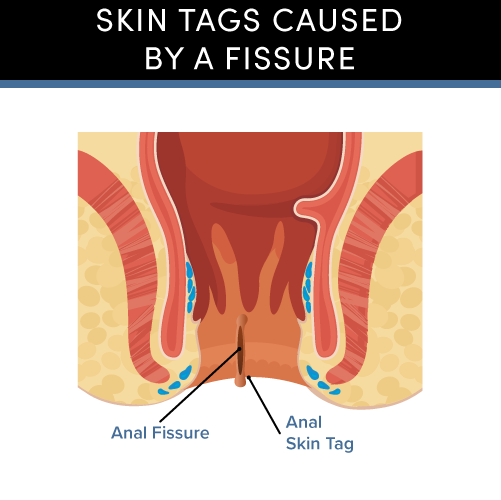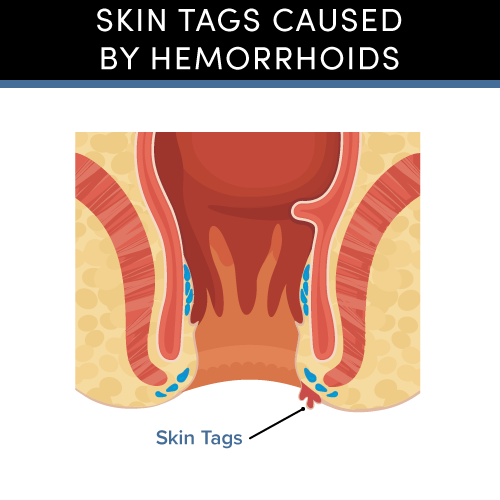What is an Anal Skin Tag?
Skin tags are benign extra-folds of anal tissue. Anal skin tags can be caused by injuries near the anus, like hemorrhoids or fissures. They are also commonly referred to in the medical community as sentinel, rectal, and perianal skin tags. They may develop from the stretched overlying skin of a thrombosed external hemorrhoid or the way in which the tissue in an anal fissure fails to heal properly.


Causes of Anal Skin Tags
Anal skin tags stem from many different sources:
- Anal tears (fissures)
- Dilated veins (hemorrhoids)
- Anal abscesses/infections
- Anal gland tunnels (fistulas)
- Anal intercourse
- Irritation and friction near the anus
- Intense exercise, like weightlifting
- Blood clots around the anus
- And more
But the main impetus lies with some type of localized injury. Skin, and its healing capacity, has limitations, specifically as it relates to the anal region. Defecation and intercourse are high pressure actions that continuously irritate a wound, especially as it is attempting to close. And clearly we have to defecate.
Because of this persistent trauma and the skin attempting to heal, it gets frustrated. It basically lays down a scar as best as it can and then grows out with extra skin, hence the anal skin tag. This healing is beyond common, with anal tears or fissures that attempt to mend with a skin tag in the region (many think it’s actually from a hemorrhoid, but in fact it’s how that tear healed.)
Is it a Hemorrhoid or Skin Tag?
The difference between hemorrhoids and anal skin tags is that skin tags are just extra tissue, whereas hemorrhoids are swollen veins. Skin tags typically don’t bleed and are skin-colored, while hemorrhoids bleed easily and tend to be reddened.
While not the same thing, they are related skin tags can be caused by hemorrhoids. With hemorrhoids (or dilated veins), the blood actually stretches the skin and, after the hemorrhoid resolves itself, the skin does not rebound back to its original shape, leaving a tag. So unfortunately, there are many different ways to wind up with a skin tag in the anal region and many have functional and/or aesthetic limitations that require surgical attention. Luckily, there are multiple options for anal skin tag treatment.
What are the Symptoms of an Anal Skin Tag?
Anal skin tags can cause localized irritation, discomfort, itching, and can be considered aesthetically unpleasant. They may cause hygiene problems, and also interfere with anal intercourse. Primarily, you’ll feel the raised bump of skin. The skin may be discolored. The main difference between hemorrhoid and skin tag bumps is the pain level, however: hemorrhoids are painful and bleed, while skin tags tend not to bleed.
How are they Diagnosed?
Anal skin tags are diagnosed by a doctor through visual inspection. An anosocopy is performed as well to ensure there are no other associated issues, specifically a connection to hemorrhoids or cysts that may change the surgical approach. Some doctors may use a physical examination or take a sample of tissue to biopsy. Once your anal skin tag has been diagnosed, you can look into anal skin tag removal options.
How to Get Rid of Anal Skin Tags
Non-Surgical Anal Skin Tag Treatment
Some tags may resolve on their own over time, while utilizing sitz baths and Proctozone 2.5%, a prescription topical ointment. In most cases, however, anal skin tag surgery is required.
Anal Skin Tag Surgical Treatment at Bespoke Surgical
Skin tags range from small to extra-large in size, and many have both physical and psychosocial ramifications. These limitations set the stage for surgical treatment with several options available, all depending on the severity. Skin tags are either removed via laser/electrocautery or surgical excision, with thought given to both functional and cosmetic goals.
While skin tags appear on the exterior of the body, they may actually be connected to something deeper. That’s why a thorough internal and external anal examination is key, prior to removal, as what looks to only be superficial is usually only the tip of the (anal) iceberg.
If a skin tag is found to be purely external, a simple in-office removal under local anesthesia can be performed with a quick recovery to follow. The pain is limited and most irritation occurs while wiping post-defecation. There are no limitations for exercise; however, bottoming or any kind of receptive anal play should be avoided for two weeks so that appropriate healing can take place. The good news is: topping is allowed.
When external anal tags have an internal component, it stems from the healing of an anal tear (aka an anal fissure) or a dilated vein (aka a hemorrhoid). Regardless, you should take care of the skin tag in its entirety in order to see appropriate results. That means removing the skin tag and the pathology at hand.
To learn more about the anal skin tag surgery offered at our NYC office, contact Bespoke Surgical today.
Recovering from Anal Skin Tag Surgery
Many times, we add Botox to help aid the healing process because this relaxes the muscle sphincters. Additionally, there are times when we leave the wound open (meaning we do not suture it closed) for two reasons: first, it heals quite well when left open and secondly, in many people, we do not want to make the hole any tighter because this may limit normal defecation and/or sexual activity in the future.
Regardless of how the area is left after surgery, the healing process is similar. The first 3-5 days will be the most difficult, with feelings of constant annoyance and/or a sense of local spasm. Pain can be controlled with narcotics and Ibuprofen, combined with suppositories, lotions, and daily Epsom salt baths. Using a bidet during this time can be a gentler method of cleansing the area.
After this period comes 1-2 weeks of more localized pain during bowel movements. This time, using non-narcotic pain meds and continuing with the other aforementioned remedies will aid in recovery and minimizing discomfort. After another 2-3 weeks, the pain should be mostly resolved, though full healing will come after roughly 6-8 weeks post-surgery.
As for getting back to normal daily activities, clients can start exercising after 5 days and begin topping or engaging in non-anal play after one week. If used, the stitches are dissolvable; however, if the wound is left open, in-office cauterization of the wound with silver nitrate will aid in healing. At the eight-week mark, we start using anal dilators to assist in healing and restoring the anal architecture. This fully allows for our clients to achieve their anal desires, if that’s part of their goal.
Preventing Anal Skin Tags
This is such a multifactorial answer as it relates to all ailments that can occur anally. However, one answer that is not true is to stop having anal intercourse. Why would anyone ever suggest that to you? The key is to understand the science of both defecation and anal sex with the hopes of minimizing trauma to the region. This will of course decrease the incidence of any associated pathology that may cause anal tags.
Some other ways to help avoid the development of anal skin tags include:
- Regular soft stools through an increase in fiber intake
- Not sitting on the toilet bowl for too long
- Taking standing breaks or working at a standing desk at work
- Doing squats or leg exercises (and making sure to only contract your glutes and not your asshole)
A lot of our anal skin tag prevention tips can also help prevent hemorrhoids. For a complete guide, check out our blog post “How To Prevent Hemorrhoidsâ€. The final suggestion is to see a physician soon after an injury or if the symptoms are persisting. It’s key to see a physician who understands our community and has the knowledge to support appropriate treatments. Early interventions can help with a complete resolution or at least minimize any long term consequences.
Expert Treatment With Bespoke Surgical
Don’t let other surgeons or physicians tell you it can’t be done or that it will heal right back with another skin tag. If it’s done correctly and with someone who has the proper knowledge, this won’t happen. Another disclaimer: don’t let someone simply excise the tag if there are other associated issues. Your surgeon needs to take care of the primary pathology first in order to ensure an appropriate outcome.
Some anal tags may even need 2-3 surgeries to accomplish the task at hand. Form, function, and aesthetics go hand-in-hand and should be weighed equally in the decision-making process.
At Bespoke Surgical, we can handle all sizes and types of skin tags and we will tailor our medical and surgical management to fit the unique needs of each client. This bespoke treatment helps navigate our clients successfully through their recovery. We’re an elite anal surgery practice, purpose-built to focus on wellness and health. Contact us today if you want your anal skin tag questions answered.


